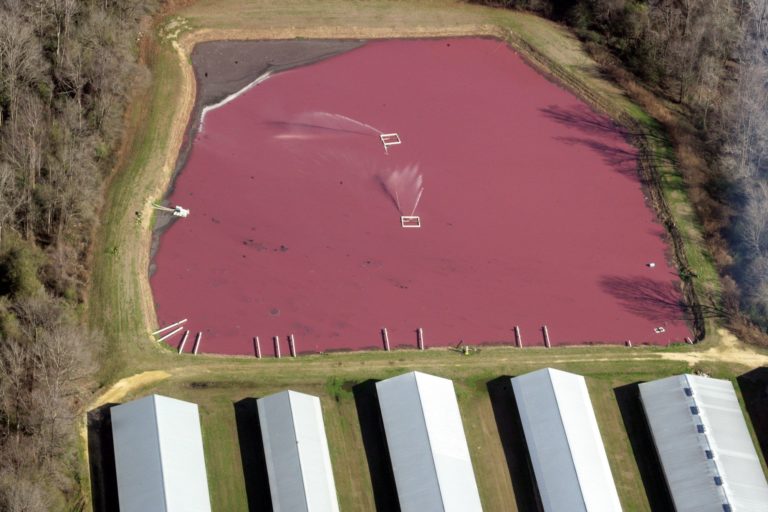Don’t Let CAFOs Hide Their Pollution | Dive Into Democracy
By: Larissa Liebmann

A few weeks ago, the Senate’s Committee on Environment and Public Works held a hearing on the “Agriculture Creates Real Employment (ACRE) Act” (S. 2663). Some members of Congress want to give concentrated animal feeding operations (CAFOs) more free passes to pollute. These industrial-scale facilities create massive amounts of animal waste, which, if improperly managed, release pollutants to the air and ground and surface waters. If the provisions in the ACRE Act become law, it will be harder for the public or U.S. Environmental Protection Agency (EPA) to do anything about CAFOs illegally contaminating our waterways and drinking water with animal waste.
The ACRE Act is an industrial agriculture wishlist written into a bill. Parts of it focus on making the operations of CAFOs and the pollution associated with them a government secret. One section of the ACRE Act would prevent the public from accessing information held by the EPA about CAFOs’ operations and environmental impacts. This information is currently accessible to the public and is essential for meaningful public participation in permitting actions. Keeping information about how CAFOs store and dispose of their waste and how close the facilities are to waterways secret would make it harder for people to protect themselves, their waterways, and their communities from illegal discharges of dangerous water pollutants.
In addition to obliterating transparency in CAFO permitting actions, the ACRE Act prohibits EPA from using essential publicly available information like Google Earth and U.S. Department of Agriculture aerial imagery without a court order upon proof of “reasonable suspicion” of a violation or permission from the facility they are supposed to be investigating. However, Google Earth and aerial imagery are essential to identifying and documenting violations at CAFOs, which means this bill limits law enforcement by diminishing the tools EPA can use to identify where violations may be happening.
Kemp Burdette, the Cape Fear Riverkeeper, explained why these provisions are so troubling:
“There are more factory farms in the Cape Fear River Basin than any other place on planet Earth, and the pollution released from these operations is enormous. The air and water pollution from these CAFOs include nitrogen, phosphorus, heavy metals, toxic gases including methane, hydrogen sulfide, and ammonia and even deadly bacteria and viruses such as MRSA and salmonella.
CAFOs already operate in relative secrecy. Frequently, aerial imagery is the only way to document illegal activities on CAFOs, which Waterkeepers around the country do on a regular basis. The ACRE act is clearly an industry attempt to shield itself even further from oversight, which will be disastrous for our nation’s waterways and the people who depend on them.”
On top of the secrecy provisions, the ACRE Act includes a section that would exempt most discharges of pesticides into our nation’s waterways from the Clean Water Act. This provision is very similar to a bill that passed the House of Representatives in 2017 and is an attempt to allow uncontrolled releases of pesticides into waterways.
This week, we are asking you to call your Senators and ask them to oppose the ACRE Act. Here are some points you can highlight:
- I am a constituent — I live in [CITY, STATE].
- I am calling to voice my concerns about Senate bill number 2663, called the ‘Agriculture Creates Real Employment,’ or ‘ACRE’ Act.
- The ACRE Act is nothing more than an industry wishlist for the companies that run concentrated animal feeding operations.
- Concentrated animal feeding operations, often called CAFOs, create massive amounts of animal wastes, and if CAFOs improperly manage this waste, they can contaminate waterways and drinking water and make people sick.
-
The ACRE Act includes a number of provisions intended to undermine the public’s right to know about CAFOs and the impact of CAFOs on water resources and communities.
-
It is also intended to create barriers to actions intended to address illegal pollution discharges by EPA and the public.
-
This bill also includes a provision that would make it easier for companies to dump toxic pesticides into waterways by eliminating the need for a Clean Water Act permit.
-
Overall, the ACRE Act is giving powerful agriculture and pesticide companies a free pass to pollute and deny citizens the right to know about and be protected from pollution in their waterways.
- Please oppose this bill.
[CongressLookup]